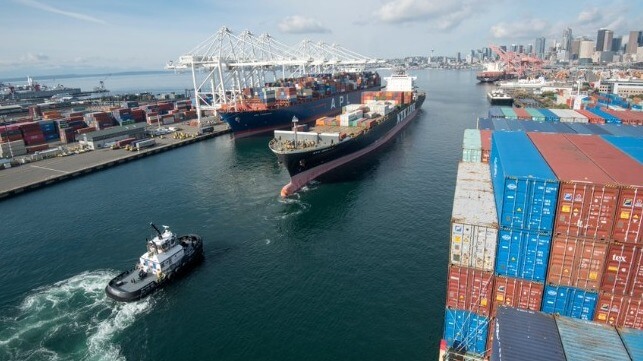The imbalance between U.S. imports and exports and the repeated complaints from manufacturers and the agricultural sector in the United States over the inability to export their goods continue to be the driving force for new efforts to examine the ocean carriers’ export services. In the latest report from the Federal Maritime Commission, they indicate that the staff is moving forward “expeditiously” with the efforts to examine how key ocean carriers are serving U.S. export shippers.
Repeated complaints from the export community are driving the FMC’s actions along with new initiatives working their way through the U.S. Congress. The concerns of exporters are a key part of the pending legislative reform to the Ocean Shipping Act. After passing both the U.S. House of Representatives and Senate, the bill is currently awaiting a conference committee to address differences between the two versions of the bill. However, having gained broad bipartisan support the bill is expected to move forward into a final form and reach President Biden for his signature.
The FMC, however, has not been waiting for the new authorities it will be granted when the bill becomes law as well as the elements of the bill focusing on revising the export operations of the ocean carriers. In March, at the direction of FMC Chairman Daniel Maffei, the commission staff began a sweeping review of exports and the actions of the ocean carriers.
“Helping U.S. export shippers is my top priority as Chairman and I will ask my fellow Commissioners and Commission staff to utilize the full extent of our authority to ensure American agricultural producers and manufacturers reach overseas markets,” says Maffei.
This week, the staff completed the first phase of the review which is being undertaken by the Commission’s Vessel Operating Common Carrier (VOCC) Audit Program. This included the first round of meetings with 11 shipping lines. On April 19, representatives of CMA CGM, COSCO, HMM, Yang Ming and Zim were scheduled to appear at the FMC. This followed earlier appearances by representatives of carriers including MSC, Hapag, ONE, OOCL, Evergreen and Matson. In each meeting, the staff discussed recent trends in carrier export numbers, placing a particular focus on agricultural exports.
“The information the Audit Team is gathering from the shipping lines will be invaluable in identifying what carriers are doing well in carrying exports and where we must push carriers to do more,” says Maffei.
While the staff is expected to continue to engage ocean carriers on export issues to gain better insight into market trends and performance as it relates to exports, the audit team is expected to present initial findings from the interviews to the FMC at a meeting later this spring.
These are part of a comprehensive initiative underway by the FMC to encourage the ocean carrier industry to increase export service. The commission has also taken steps to improve its exporter assistance services. In addition, the Bureau of Enforcement launched an examination of five independent ocean carriers calling at U.S. ports to determine if their conduct related to the export trades is compliant with U.S. statutes. The chairman has also placed a priority on all cases involving exporters.
The monthly reports for ports around the U.S. high the urgency to focus on exports. The U.S.’s busiest port, Los Angeles, reported as of March 2022, exports have declined for 37 of the last 41 months. In March 2022, loaded exports represented just one percent of the containers moving through Los Angeles with other major U.S. container ports reporting similarly low numbers for loaded exports.
Source: The Maritime Executive






